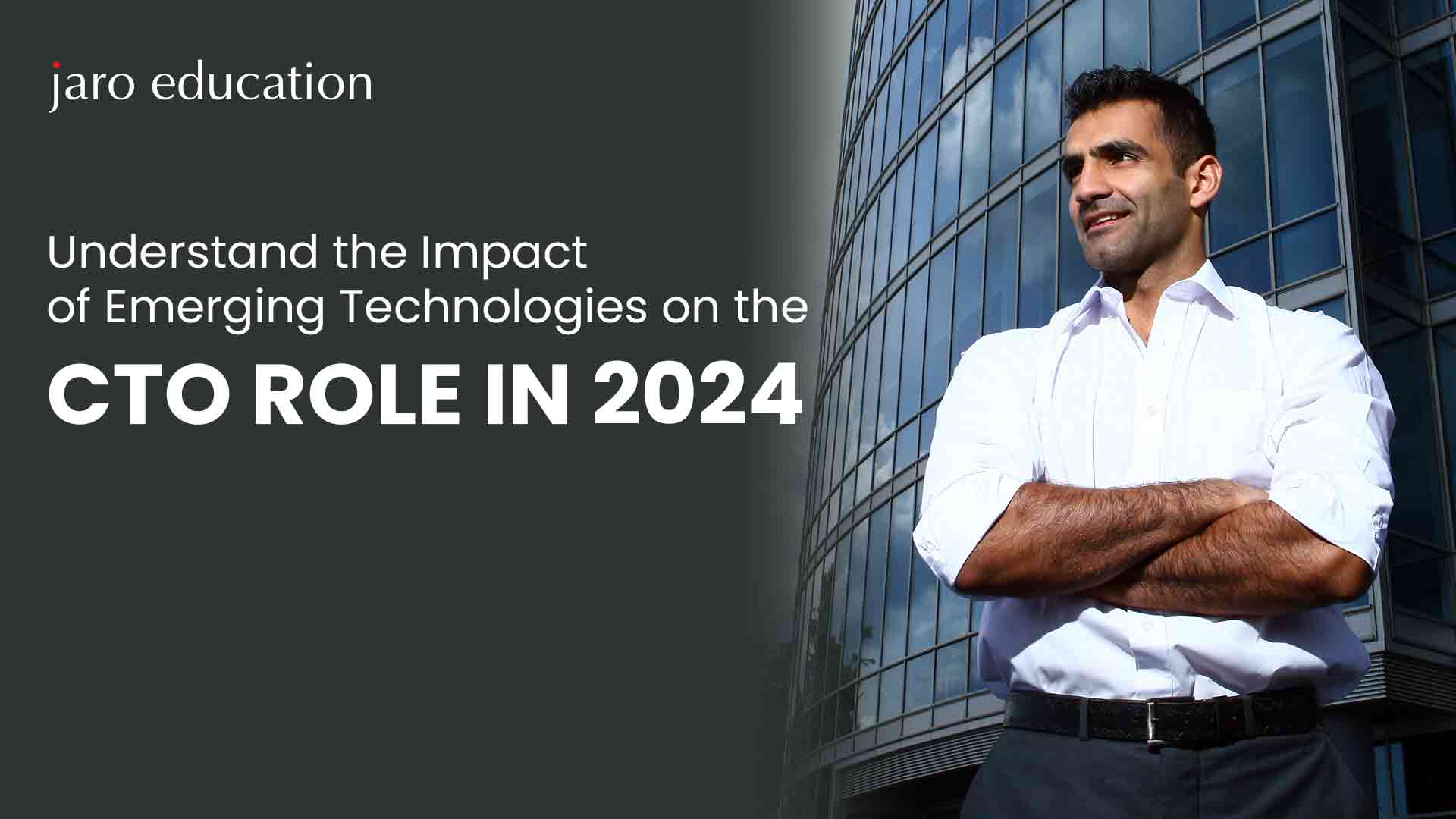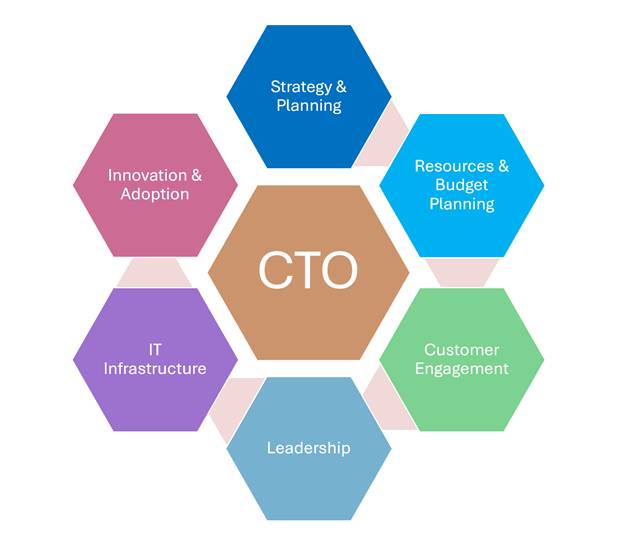
Understand the Impact of Emerging Technologies on the CTO Role in 2024
Table Of Content
Top Emerging 15 Technologies Relevant for CTO Role
Impact of Emerging Technologies on the CTO Role
Conclusion
Top Emerging 15 Technologies Relevant for CTO Role
1. Artificial Intelligence and Generative A
Artificial Intelligence (AI), especially Generative AI (GenAI), is revolutionizing business processes and operational efficiency. GenAI is expanding its influence across multiple domains, enabling businesses to harness advanced databases like graph and vector databases, which are becoming increasingly significant for GenAI applications. These advancements are not just about automating tasks but also about enhancing creativity and productivity through tools like ChatGPT and Microsoft Copilot-like assistants.
2. Cybersecurity and Blockchain
In 2024, cybersecurity remains a top priority for CTOs. The rise of social engineering attacks and identity-based breaches emphasizes the need for robust cybersecurity measures. Meanwhile, blockchain technology offers secure and transparent data management across various industries. CTOs are increasingly responsible for implementing blockchain to gain a competitive edge and for establishing comprehensive security protocols to protect digital assets.
How technologies like Artificial Intelligence and advanced cybersecurity are redefining the role of a CTO. The Chief Technology Officer Programme Offered by CEP, IIT Delhi is structured to mirror these developments. It offers an immersive curriculum that encapsulates the nuances of these technologies, ensuring that our participants are not just abreast of the latest trends but are also capable of leveraging them strategically.
3. Quantum Computing
Quantum computing is rapidly emerging as a powerful force, especially in fields requiring immense computing power such as AI model training. This technology is expected to revolutionize areas like drug discovery, medical research, genome sequencing, and cybersecurity. With the potential to handle high-dimensional data effectively, quantum computing’s integration with AI is particularly promising. The global market for quantum computing is projected to grow significantly and reach approximately $4.3 billion by 2028.
4. Industry Cloud Platforms (ICPs)
ICPs are tailored cloud solutions designed to meet specific industry requirements, offering a blend of SaaS, PaaS, and IaaS services. These platforms are crucial for industries looking to innovate and gain real-time operational insights. ICPs offer the flexibility and agility to manage workloads and adapt to changing business needs, with leaders like AWS, Salesforce, and Microsoft Azure at the forefront.
5. Internet of Things (IoT) and Big Data
IoT and big data are creating new opportunities and challenges. The global Big Data and Analytics market is worth $274 billion and the IoT market is currently worth $800 billion. IoT devices generate vast data volumes, providing valuable insights if properly harnessed. CTOs must manage the aggregation, storage, and analysis of these large data sets. Big data represents the convergence of various data streams, requiring CTOs to navigate data management complexities while ensuring compliance with privacy laws and ethical guidelines.
6. Generative AI in Data Security
Generative AI is not only transforming creative and operational processes but is also playing a pivotal role in enhancing data security. With the vast amount of data flowing through businesses, manual monitoring becomes impractical. Here, intelligent systems powered by machine learning take on the critical role of understanding what constitutes normal operations and flagging anomalies. This trend indicates a shift towards AI-driven security systems that are more proactive and adaptive to emerging threats.
7. Robotic Process Automation (RPA)
RPA is revolutionizing how businesses automate routine tasks. It’s not just about replacing manual work but also about creating new job opportunities and enhancing operational efficiency. CTOs must understand the strategic implementation of RPA, ensuring it aligns with business goals and drives value. This technology demands a focus on developing RPA solutions, analyzing processes, and architecting systems that integrate seamlessly with existing business operations.
8. 3D Printing Innovations
3D printing technology is advancing rapidly, impacting sectors like biomedical and industrial manufacturing. For CTOs, this means staying ahead in understanding and implementing how these technologies can be integrated into their existing operations and identifying new opportunities they present. This involves understanding the latest in 3D printing technology, from managing customer experience programs to engineering 3D printing solutions and even developing new prototypes and products.
9. Genomics and Healthcare Technology
The field of genomics is dramatically influencing healthcare technology. For CTOs in healthcare and related industries, this means staying informed about the latest developments in genetic analysis and their applications in healthcare. The role might involve overseeing the development of genomics software, analyzing genetic data, or even bridging the gap between biology and data analysis. This trend signifies the importance of understanding the implications of genomics on healthcare, privacy, and ethical considerations.
10. Extended Reality (XR)
Extended Reality, encompassing virtual reality (VR), augmented reality (AR), and mixed reality (MR), is rapidly becoming a crucial part of various industries. For CTOs, this means not only understanding these technologies but also exploring how they can be applied to enhance customer experiences, training, and product development. The role of CTOs involves leading extended reality projects, developing XR software, and even designing immersive experiences. As XR technologies become more mainstream, their application will likely extend beyond gaming and entertainment to fields like education, healthcare, and retail.
11. New Energy Solutions
The drive towards sustainability is influencing technological innovation, especially in the energy sector. CTOs must be aware of developments in renewable energy sources like solar, thermal, and hydro-power. This involves understanding the technologies behind electric cars, solar power, and other renewable energy sources, as well as how to integrate them into existing business models and infrastructures. The focus here is on innovation in sustainable technology, project management in energy-related projects, and developing new energy solutions that align with global sustainability goals.
12. Conversational AI
Conversational AI is revolutionizing customer service and engagement. As AI becomes more sophisticated, it enables businesses to provide more personalized and efficient customer interactions. For CTOs, this means implementing and managing AI-driven communication systems, understanding the underlying technologies, and ensuring they align with the company’s customer service objectives. Conversational AI is not just about automating customer service; it’s about enhancing the customer experience while maintaining efficiency and effectiveness.
13. Low-Code Development Services
The rise of low-code and no-code platforms is democratizing app and software development, making it accessible to more people across an organization. This trend requires CTOs to understand and integrate these platforms into their IT strategy, enabling faster and more efficient development of applications. Low-code development can significantly speed up digital transformation initiatives by allowing non-technical staff to contribute to the development process, thereby fostering innovation and creativity throughout the organization.
14. IT Security and Ransomware Defense
With the increasing prevalence of cyber threats, particularly ransomware, IT security remains a paramount concern for CTOs. This involves not only implementing strong cybersecurity measures but also staying ahead of emerging threats. CTOs must focus on developing comprehensive security management or strategies that include ransomware defense, regular security audits, and ensuring compliance with the latest data protection regulations. The role also involves educating the workforce about security best practices and fostering a culture of security awareness.
Impact of Emerging Technologies on the CTO Role
In 2024, the role of a Chief Technology Officer (CTO) is significantly influenced by a range of emerging technologies, each bringing its own set of challenges and opportunities. Here is how these emerging technologies may Impact on the CTO’s :

*devskiller.com
- The integration of Artificial Intelligence (AI) and Machine Learning (ML) necessitates a profound understanding of these technologies and their ethical implications, prompting a cultural shift towards AI-driven processes within organizations.
- Cybersecurity continues to be a paramount concern, requiring CTOs to deploy advanced security measures against increasingly sophisticated threats and foster a pervasive cybersecurity awareness.
- The convergence of Cloud and Edge Computing demands adept management of data and IT resources by CTOs, striking a balance between scalability, efficiency, and real-time processing while upholding data privacy and security.
- The implementation of 5G and advancements in networking technologies open up new possibilities for enhancing business operations, requiring infrastructures capable of supporting heightened data flow and connectivity.
- Quantum Computing is still in its nascent stages, it holds potential future impacts on computational tasks, warranting vigilant attention from CTOs.
- Sustainability and Green IT practices have become imperative, placing the responsibility on CTOs to optimize energy efficiency and select sustainable technologies.
- The ascent of Blockchain and decentralized technologies introduces novel approaches to secure and transparent data handling, challenging CTOs to effectively implement these technologies while navigating regulatory landscapes. With the exponential growth of data, CTOs are increasingly focused on leveraging big data analytics to drive decision-making, necessitating investments in appropriate tools and skilled teams.
- The shift towards remote and hybrid work models compels CTOs to ensure robust technology infrastructure support, prioritizing secure remote access and effective collaboration tools.
- Lastly, the potential transformative impact of Augmented Reality (AR) and Virtual Reality (VR) on business processes, ranging from training to product development, requires CTOs to explore and integrate these technologies into overarching business strategies.
In sum, these emerging technologies collectively demand a synthesis of technical acumen, strategic foresight, and leadership from CTOs, underscoring their pivotal role in guiding organizations through the swiftly evolving digital landscape.
Addressing these paradigm shifts and technological shifts, IIT Delhi has introduced its cutting-edge ‘Chief Technology Officer Programme,’ designed to empower CTOs to navigate and harness these changes effectively. The program dives deep into emerging technologies – Blockchain, AI & ML, Digital Twins, Generative AI, not just from a technical standpoint but also considering their ethical impacts, preparing leaders for AI-driven transformations in their organizations.
At its core, this course focuses on cultivating a blend of technical acumen, strategic foresight, and visionary leadership. This comprehensive approach is designed not just to enhance technical skills but to mold participants into leaders who can confidently steer their organizations through the complexities and opportunities of the digital era.
Conclusion
In conclusion, as these technologies continue to evolve, the CTO’s role is becoming more crucial for business success. The CTO’s mandate extends beyond traditional responsibilities, encompassing the integration of artificial intelligence, cybersecurity fortifications, and the orchestration of a technological symphony that drives organizational resilience and growth. In navigating emerging technologies, the CTO emerges as a visionary architect, balancing innovation with ethical considerations and regulatory compliance. In 2024, the
CTOs need to stay abreast of these trends, continuously upskill, and foster a culture of learning within their organizations to leverage these technologies effectively.

